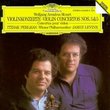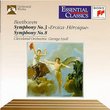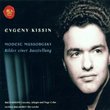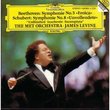| All Artists: Joshua Bell, Roger Norrington, Camerata Salzburg, Mendelssohn, Beethoven Title: Mendelssohn & Beethoven: Violin Concertos Members Wishing: 0 Total Copies: 0 Label: Sony Release Date: 6/11/2002 Genre: Classical Styles: Chamber Music, Historical Periods, Classical (c.1770-1830) Number of Discs: 1 SwapaCD Credits: 1 UPC: 696998950528 |
Search - Joshua Bell, Roger Norrington, Camerata Salzburg :: Mendelssohn & Beethoven: Violin Concertos
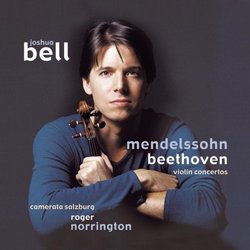 | Joshua Bell, Roger Norrington, Camerata Salzburg Mendelssohn & Beethoven: Violin Concertos Genre: Classical
Joshua Bell's first recordings of these warhorses stand apart from the hundreds of versions crowding the catalogs in at least one respect, namely his own cadenzas. Beethoven didn't supply his own for the long first movemen... more » |
Larger Image |
CD DetailsSynopsis
Amazon.com Joshua Bell's first recordings of these warhorses stand apart from the hundreds of versions crowding the catalogs in at least one respect, namely his own cadenzas. Beethoven didn't supply his own for the long first movement of his Violin Concerto, and Bell's thoughtful, stylish emendation easily stands with the frequently played Kreisler and Joachim cadenzas as a viable option. His extroverted yet well-proportioned cadenza in the Mendelssohn may not match the original's instant melodic appeal, but it certainly works. Elsewhere, Bell's direct, clean-cut, utterly dependable virtuosity will not surprise his legions of fans, who won't mind that the violin tends to dominate in the mix. Is that due to the engineering, or to Roger Norrington's somewhat reticent accompaniments? You'd think a chamber orchestra would help the Mendelssohn's bubbling woodwind licks emerge with greater clarity. Likewise, small forces are capable of richer, more tonally varied, and sustained string tone in the Beethoven's slow movement, as one hears in the more confrontational and interesting Richard Kapp-Mela Tenenbaum collaboration. --Jed Distler Similarly Requested CDs
|
CD ReviewsStunning new performances Les Jones | Senecaville, OH USA | 01/08/2005 (5 out of 5 stars) "I greatly enjoyed the recordings of the Mendelssohn and Beethoven violin concertos by Joshua Bell and the Salzburg Camarata. They are ... Lyrical and vigorous. Forceful and gentle. Original and respectful of tradition. Technical but tasteful. And they sing with the joy of music-making in every measure. There is a sense of drama where appropriate and always a keen feel for the emotional depth of the music. But, I have read some other reviews that are not as favorable and I would like to make a few comments about those. The orchestra is smaller than people are used to hearing. This is probably consistent with performances during the composers' lives but it sounds a little unfamiliar to listeners today. With a smaller orchestra, the balance between brass and strings is always on the brass side. But I found their playing very articulate except for a few places that could have been edited (live performances by all performers have a few of these). Second, there were mixed reviews about Bell's use of his own cadenzas. I thought they are tasteful and interesting. Over the years I have been really disappointed by some of the candenzas played by even well-known violinists in the Beethoven. Bell's cadenzas seemed in the spirit of the works. A reviewer complained that Bell's vibrato was a little too much in places, and I tend to agrees with that; but it's all a subjective. A few other problems that people had can be attributed to Bell's own style of intonation, the fact that some very soft passages just don't come through on the recording (which is Sony's fault) and the fact that, let's face it, we are creatures of habit and anything even a little bit new and different takes a little time to accept." The day of the Romantic performer returns Grady Harp | Los Angeles, CA United States | 11/22/2002 (4 out of 5 stars) "Joshua Bell has become an image for young classical musicians to emulate. He is not only a superbly gifted violinist and brilliant technician, but he also has heart and is not afraid to imbue his personality on the showpieces of the musical literature. That is why composers of concerti wrote cadenzas - to allow the performer to improvise on what the composer had writen and add his own spirit to the completion of the statement. This recording does not show Bell in all his glory. The orchestra as conducted by Norrington feels leaden, never airily dancing in the same plane as Bell. The Mendelssohn survives this, but Bell's Beethoven longs for a more simpatico conductor with whom to corroborate. Still in all this is a good recording, another in a growing list of the variety of work that makes Joshua Bell a matinee idol. No empty '3 tenor' hype here, just a gifted romantic sharing his joy." Joshua Bell does it once again Sharon J. Williams | Whitmore Lake, MI USA | 02/23/2006 (5 out of 5 stars) "If you haven't heard of Joshua Bell, take a tour on Amazon of his recordings. He is a young man with a beautiful hand on the violin. His interpretations are as wonderful as YoYo Ma on cello or Ruth Larado on piano. I sneek a CD of his in every few orders from Amazon. He makes the violin speak and becomes one with it as he plays."
|

 Track Listings (6) - Disc #1
Track Listings (6) - Disc #1




